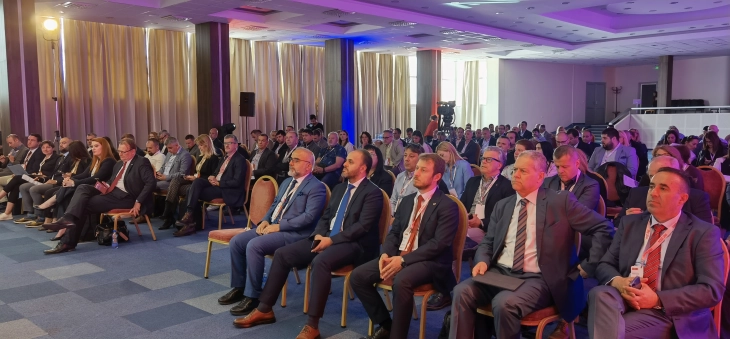AEC hosts International Regulatory Conference 2024 in Ohrid
- The security of electronic communication amidst rapid technological development is an issue of enormous interest and challenge in the area hence, it is one of the issues high on the agenda of the 20th International Regulatory Conference 2024 organized by the Agency for Electronic Communications (AEC) that is held May 14-15, in Ohrid.
- Post By Silvana Kocovska
- 14:27, 14 May, 2024

Ohrid, 14 May 2024 (MIA) - The security of electronic communication amidst rapid technological development is an issue of enormous interest and challenge in the area hence, it is one of the issues high on the agenda of the 20th International Regulatory Conference 2024 organized by the Agency for Electronic Communications (AEC) that is held May 14-15, in Ohrid.
Representatives of the International Telecommunication Union, regulatory bodies and the European Union, members of the academia, operators and companies, stakeholders in the global communications market will discuss this issue, as well as spectrum management and monitoring electronic communications, regulatory issues and broadband internet access, in the context of the latest inspirational areas in electronic communications.
AEC Director Jeton Akiku said that compared to previous conferences when the focus was on implementing and facilitating the 5G network, this year focus will be placed on measuring and concrete results from the implementation of the 5G network and cyber-security issues.

"North Macedonia has the best 5G network in the region and continent, with the two operators reaching speeds of over 1 megabyte per second, and an average of 300 megabytes across the country," Akiku said.
He noted that the security aspect of electronic communications affects developed countries the most, and that is more commercial in use.

"Once we became a NATO member, there has been an increase of cyber-attacks in our country, which proves that those attacks are of a political nature. As a small country I can say that we dealt with those attacks well, especially during the election campaign when there was an increase in attacks of political nature, but the situation was well-managed," Akiku noted.
The region follows trends in the area of electronic communication, but falls behind European standards, although, according to experts, it is a logistical consequence of the later start in the development of that field and real economic circumstances.

"All countries are currently making good progress. Even Croatia, who has been part of EU for a decade, has not reached the European average in the field of electronic communication," said Body of European Regulators for Electronic Communications (BEREC) chair and president of the Croatian Regulatory Authority for Network Industries Tonko Obuljen.
Regarding the security of communication, he stated that it is a complex issue, with various possibilities for threats and abuses, while highlighting the individual as the most critical factor in security challenges. According to Obuljen, regardless of how much is invested in network security, all one has to do is find a weak spot rendering all security threats invalid.
"What's perhaps the biggest challenge on everyone's mind currently is the implementation of artificial intelligence in those negative directions, such as creating fake calls and news, and generating threats. It used to take a lot more effort and time, now it's easier, there are hundreds of ways to dismantle a network. We have to figure out how to deal with it, I believe that we will need a lot more experts, which creates additional issues because the people who learn the skills can better sell themselves worldwide, where there is demand. The challenge is figuring out how to stop that," Obuljen stressed.
Representatives of the regulatory bodies presented their retrospectives regarding these issues in their countries. Experts discussed exchanging experiences, technologies and access to solving a number of critical forms for the protection of the digital landscape were some of the main topics of discussion during the first day of the conference. ssh/sk/
Photo: MIA







